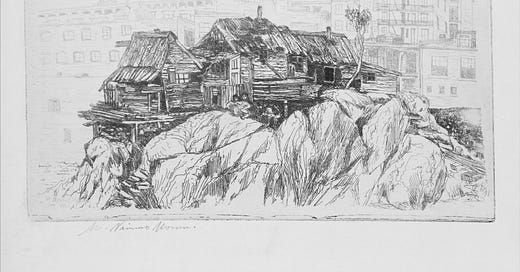"Your habit of approaching everybody as a person, as an individual, won't work here" | The Dispossessed, Chapters 3-6
The story is really two stories
Today, we continue our read-along of The Dispossessed by Ursula K. Le Guin. The schedule for the read-along can be found here.
February 10: Introduction to Le Guin’s life and work
February 17: Chapters 1-3
February 24: Chapters 4-6
March 2: Members-Only Zoom Call, 8PM Eastern
March 3: Chapters 7-9
March 10: Chapters 10-13
March 13: Members-Only Zoom Call, 3PM Eastern
All of those posts are free — anyone can join. But twice during this read-along (March 2 and March 13), I’ll be hosting members-only Zoom calls to discuss the book with paying subscribers. If you want to join those calls, just click the button below.
(And since people always ask: I send the links out about an hour before the calls, both via Substack Chat and via a separate paid-only post.)
By now, the structure of The Dispossessed should be clear to you. The story is really two stories, one centering on Shevek’s journey to Urras (and especially A-Io) and one centering on Shevek’s life on Annares. The story on Urras is more compressed; so far, we’ve covered months. His Annares story spans many years, starting from his birth. Dual narratives are especially effective when an author can find thematic parallels between the stories — and starting this week, I think we see how Le Guin excels at this.
Consider in Chapter 4, where Shevek makes his way to Abbenay (meaning Mind in Pravic). Shevek must work with Sabul, a senior physicist. Previously, he was warned that by going to Abbenay, he would be Sabul’s man, a concept he struggles to understand at first. He quickly learns that Sabul will attempt to own his ideas. When Shevek is ready to publish a book and send it to Urras for consideration, the book is attributed to Sabul and Shevek. He is told by the older man that his work was the groundwork for the book; in fact, his work was the near-entirety of the book. Sabul has made a career of passing off other’s ideas as his own. Shevek realizes that Sabul controls the printing process for physics, and so he is forced to bargain.
Then in Chapter 5, we have the encounter with Chifoilisk, a Thuvian scientist. Chifoilisk wants Shevek to defect for Thu, a centralized socialist country. They will together resist the propertarians of A-Io. To convince Shevek, Chifoilisk makes it clear that Shevek has been bought.
Why do they bring you here from the Moon, praise you, print your books, keep you so safe and snug in the lecture rooms and laboratories and libraries? Do you think they do it out of scientific disinterest, out of brotherly love? This is a profit economy, Shevek!
Shevek has developed a physical theory, the General Temporal Theory, which could be the key to unlocking faster-than-light travel. The propertarians of A-Io want this for themselves, perhaps to dominate Urras and perhaps to dominate the still-forming coalition of planetary civilizations (see as an illustration Atro’s discussion of the Hainish and other non-Cetians). Chifoilisk wants this for Thu – ‘The highest cause I can ever serve is the strength and welfare of my country,’ he says – but Shevek believes that he can bargain with the people of A-Io in a way that he could not with the Thuvians.
What we’re seeing in these chapters is how Shevek navigates a world which stubbornly refuses to conform to his principles, his idealism. In Abbenay, he sees excess (and likes it); he also sees centralization and a disproportionate use of resources. Abbenay does not function like a proper Odonian community. Shevek must learn to live there and still remain true of himself. The same happens in A-Io, though at least this country makes no pretensions about its ideals. It is inegalitarian, segregated, and propertarian — and proud of it.
In both cases, Shevek reacts strongly. His body revolts. We see more of this on Anarres, perhaps because it is his first encounter with such non-conformity to Odonian principles. He has a severe fever, and while sick he is visited by his mother, a distant (and I would say ominous) figure. On Urras, he cannot stomach meat, and he becomes ill again.
It isn’t until Shevek visits Oiie’s home, meeting his wife and children, that he is asked to explain Anarres. The Urrasti struggle to understand how anything – like garbage collecting, shit processing, grave digging – gets done in Odonian society. Shevek’s answer is that is done mutually, that it is done out of a sense of solidarity, and that most importantly it is done because it has to be done.
Admittedly, this is a weak spot in the book. Shevek’s explanation of Odonian society often boils down ‘Because it works.’ He appeals to the social conscience, but even this explanation is insufficient. What keeps Anarres functioning is a strict belief in Odonian principles. Without this strict adherence, instilled from birth, how else could it work? If a fraction of the population came to believe in the profit motive, doesn’t the whole thing crumble? A civilization built on trust is a fragile thing. (The threat Abbenay poses should seem more ominous, then.)
And we see how some people deviate — like Desar. The image of Desar’s room, where things just build up, has stuck with me from my very first read; perhaps it is because it is too similar to my own propertarian room.
What we see very clearly in these chapters is Shevek as a man alone — a man who is unable to properly connect. He is disconnected from students and professors on Urras on the basis of his ideology; he is too Odonian for them. But on Anarres, he seems to struggle against Odonian constraints. His re-entering into Odonian organizations and groups does not break him out of his fundamental separation, his intrinsic loneliness.
To make things worse, his work is being stifled by colleagues who are jealous of him and intimidated. They use Odonian appeals to try and get him to stop, saying his work is too arcane (and thus perhaps egoistic). The individual is being stifled; greatness is held in disrepute.
Shevek thinks that this is due to the poverty of Anarres. The Odonians are held back from their environment. Bedap, though, sees things differently. This interaction with Bedap is crucial for the rest of the book.
Even on Urras, where food falls out of the trees, even there Odo said that human solidarity is our one hope. But we’ve betrayed that hope. We’ve let cooperation become obedience. On Urras they have government by the minority. He we have government by the majority. But it is government! The social conscience isn’t a living thing any more, but a machine, a power machine, controlled by bureaucrats.
Bedap goes on to say: ‘We don’t educate for freedom. Education, the most important activity of the social organism, has become rigid, moralistic, authoritarian. Kids learn to parrot Odo’s words as if they were laws — the ultimate blasphemy!’
This enforced conformity is shown most clearly in the story of Tirin, a friend of Shevek and Bedap. After putting on a play that could seem anti-Odonian (to stupid people, but ‘a lot of people are stupid,’ Bedap says), he is ostracized. He is publicly shamed. The mob turns on him. He is then posted to work on a road repair crew, despite his objections, and this begins a succession of manual labor jobs. It is clear to the reader that Tirin is being punished by a governmental force. We see a similar story with Salas, a composer, though less severe. Because his music is ‘not in the Organic style,’ he cannot put on performances or make recordings.
But Shevek is able to make some human connection — first with Bedap, and then with Takver, a woman I’m sure we will discuss more in the weeks to come.






There's also an interesting contrast in the things the two societies find shameful that shows up in Shevek's conversation with Oiie and his children. The Urrasti are squeamish about bodily waste and sex, for instance, but the Odonians are squeamish about propertarianism and government (the shameful and grotesque portrayal of propertarianism also shows up in their use of "illness" and "sickness" as metaphors for it). You see this attitude in Tirin's story, and in how Shevek won't even entertain Bedap's unsavory idea that Odonian society does rely, however unofficially, on authoritarian power dynamics. I think this is also part of why Shevek gives his overly simplistic explanation of his society to Oiie's children. He himself seems to have retained a childlike, almost puritanical idealism about how the Odonian society should function. He continues to deny even to himself that a society of any size and complexity does seem to give rise to hierarchies and disparate power distributions.
1) I posted in the chat thread but will do so here that reading about the groupthink ostracization you mention towards the end here on the same day I read Socrates' apology was illuminating insofar as this has been a longstanding concern of philosophers concerned with the social order.
2) One interesting thing that stuck out to me was the varying degrees of "patriotism." Between the countries on Urras; between Urras and Annares; and between Cetians and the Terrans & Hainish. I like how as you mentioned Atro talks about Cetian "superiority" but also reveals a bit of an inferiority complex, just wanting to be seen as *at least* an equal.
3) Finally, you mention a weakness in Shevek's responses to certain questions but I sort of find that to be a strength. From the narrative standpoint, it helps keep the book as informative and philosophically intriguing without being overly didactic. As a character trait, it aids in the paradoxical nature Shevek's mental state, and might indicate that, despite being a committed revolutionary, he can't necessarily explain everything, hasn't thought it all the way through, on so doing might come to question it, or is in some other such way just uncritically parroting Odonian principles. The even chapters are more obviously the "bildungsroman" but the odd chapters show that he's clearly still developing in late adulthood.